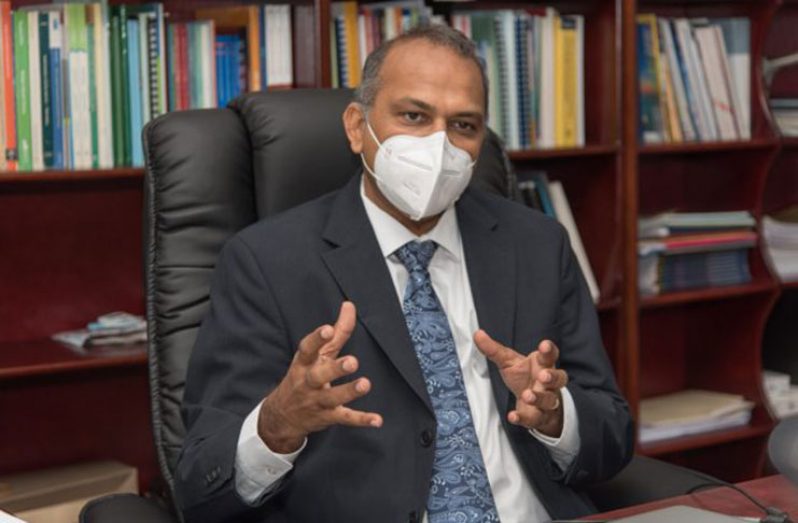-Health Minister urges public to be cautious of post COVID-19 illnesses
MINISTER of Health, Dr. Frank Anthony, is cautioning the Guyanese public to take heed of the long-term effects of coronavirus and to change their cavalier approach towards the disease.
The minister, in an interview with the Department of Public Information (DPI), noted that while the severity of the post COVID-19 illness varies, some people suffer severe long-term effects weeks and even months after the disease should have subsided.
Dr. Anthony said that he is concerned that many are flouting the COVID-19 protocols because they see many persons who fell ill with milder forms of the disease and many who are asymptomatic, recovering well.
However, some ‘recovered’ patients have also been experiencing symptoms weeks and months after the illness is supposed to have worn off.
“The latest one, maybe about a week ago that emerged, is that they are seeing cases where persons who had COVID-19, three months after, now have myocarditis which means that the muscle of the heart is being infected or there is some inflammation there and they are attributing that to the virus. They are also seeing that with many of the other organs in the body,” Dr. Anthony said.
Blood clots, blood vessel problems and mental health disorders are a few known health issues that have been recorded post COVID-19 recovery.
The minister further noted that conditions like these are now emerging and has prompted global research by scientists to determine the actual long-term effects of COVID-19 and as such the Ministry of Health (MoH) is working on a protocol to address these issues.
In the meantime the minster is urging the public to safeguard themselves from contracting the virus.
MENTAL HEALTH
Meanwhile, a study conducted by UNICEF Guyana, in collaboration with the MoH, revealed that the COVID-19 pandemic has been negatively impacting the mental health of children and young adults across the country.
In a statement on Saturday, UNICEF said the study, which included three rounds of Knowledge, Attitude and Practice (KAP) surveys, disclosed that the pandemic is having a grave impact on the mental health of Guyanese youths, which has seen a hike in drug use.
“The three main concerns that contributed to stress during the current pandemic were concern about the risk of being exposed to the coronavirus (57.6 per cent), uncertainty about the future (44.9 per cent) and adapting to a different lifestyle (41.7 per cent),” UNICEF explained.
Through the surveys, some adolescents indicated that they have been affected emotionally and mentally by the lifestyle changes due to the pandemic. Fifty-seven (57) per cent of the respondents indicated that they were unable to sleep while 54.8 per cent feels fearful; 51.1 per cent worried while 48.9 per cent are experiencing loneliness (48.9 per cent) and 48.1 per cent are often irritable.
“Due to the changes consequent to the pandemic, 44.4 per cent of adolescent respondents communicated that they were frequently anxious, 41.5 per cent reported that they were crying often, 38.5 per cent divulged that they had increased drug use, 34.8 per cent said they withdrew from others, 34.1 per cent said they were regularly depressed, 31.9 per cent said they felt hopeless, 25.2 per cent frequently considered acts of self-harm, and 20.7 per cent reported persistent disturbing thoughts,” UNICEF further detailed.
Dr. Anthony said the study will help the ministry to better respond to the needs of Guyanese during the pandemic.
“These studies have helped us to identify people’s behaviours concerning COVID-19. It has assisted us in segmenting the population and identifying those persons who are most vulnerable, such as older persons and those with underlying comorbidities, and their perception of their risk,” he said.
Minister Anthony again reiterated calls for the public to observe the COVID-19 emergency measures, including, the correct and consistent use of masks, practicing social distancing, and practicing good hand hygiene.




.jpg)










